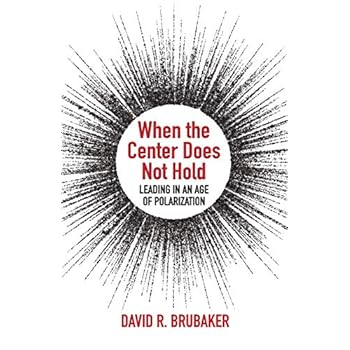[PDF EBOOK EPUB] When the Center Does Not Hold: Leading in an Age of Polarization (PDF) Ebook

Description of When the Center Does Not Hold: Leading in an Age of Polarization
Review 'The challenge of this century is not whether we will face tough and complex choices, live in divided communities, or feel in ourselves and others a powerful fear about the survival of what we may consider the essence of our identities. It is how we will choose to be and lead in the midst of these realities. This book offers a brilliant overview of contemporary dynamics around our divisions--political, social, and religious--and, more importantly, illustrates concrete pathways for how to lead with care, clarity, and understanding while navigating this age of polarization. A more timely volume could not have landed on my desk.' --Dr. John Paul Lederach, Professor of International Peacebuilding, University of Notre Dame 'When the Center Does Not Hold is an important tool for those of us in congregational and denominational systems that seem to be flying apart in the midst of intense polarization. David R. Brubaker and his colleagues offer guidance through the layers of intrapersonal, interpersonal, organizational, and political transformation that need to occur as we seek to build bridges across our polarized divides. I highly recommend this book to leaders who particularly feel they are in over their heads in the waters of intense polarization.' --Rev. Susan Nienaber, District Superintendent, United Methodist Church 'Leading from the center is harder than ever. This timely book will serve as a valued resource for pastors and leaders who find themselves fenced in by the polarizing discourse and practice of our time.' --Rev. Christopher Edmonston, White Memorial Presbyterian Church 'David R. Brubaker and his colleagues combine astute academic insight with compassionate pastoral care to guide us in the difficult challenge of social polarization. This clearly written book will help leaders and others know how to be a positive force for change.' --Dr. Ronald Richardson, Author, Polarization and the Healthier Church Read more About the Author David R. Brubaker has more than thirty years of organizational consulting and workplace mediation experience and has consulted with more than one hundred organizations and congregations since 1987. He holds an MBA degree and a PhD in sociology from the University of Arizona, with concentrations in organizations and religion. He writes a regular blog post for the Congregational Consulting Group.Everett Brubaker has been active in bridge building efforts related to environmental issues for nearly a decade. He holds a B.A. in Environmental Sustainability from Eastern Mennonite University and is an M.A. candidate ('19) in Environmental Communication from James Madison University. Everett teaches introductory courses in the School of Communication Studies at JMU and is active in community environmental work, facilitating the local Sustainable Business Coalition and assisting with other regional environmental initiatives.Carolyn Yoder has twenty-five years� experience as a psychotherapist and trauma trainer in the US and abroad. She is founding director of STAR (Strategies for Trauma Awareness and Resilience), a justice and conflict-informed training program of Eastern Mennonite University�s Center for Justice and Peacebuilding. STAR has supported thousands of civil society leaders on five continents in building resilient communities amidst crisis, division, and violence. She holds an MA in linguistics from the University of Pittsburgh and an MA in counseling psychology from Alliant International University, San Diego. Read more

Books are everywhere. Libraries big and small and bookstores are splattered all over college campuses and larger cities. They are all filled with one of the most important things of all time—books. Those who read books appreciate the multiple places to find books. Those who aren’t fans of books, don’t understand what could make readers want to obsess over books. There is a reason for their obsession, though. You hear it all the time: read every day.Reading is important because it develops our thoughts, gives us endless knowledge and lessons to read while keeping our minds active. Reading books to help us learn and understand and makes us smarter, not to mention the knowledge, vocabulary and thinking skills we develop.In the world today where information are abundant, reading books is one of the best ways to be informed. Though reading might seem like simple fun, it can be helping your body and mind without you even realising what is happening. What makes reading so important? It can be for these reasons and not just knowledge.For those who don’t enjoy it, you might change your mind after hearing about the benefits. Can something so easy and fun be so helpful in your life? Of course, it can! Reading can be a great benefit to you in many different ways—such as sharpening your mind, imagination, and writing skills. With so many advantages, it should be an everyday occurrence to read at least a little something.Books can hold and keep all kinds of information, stories, thoughts and feelings unlike anything else in this world. Can words, paragraphs, and fictional worlds be all that great for you and your health? It definitely can, and it is a timeless form of entertainment and information
Step-By Step To Download When the Center Does Not Hold: Leading in an Age of Polarization
- Click The Button "DOWNLOAD" Or "READ ONLINE"
- Sign UP registration to access & UNLIMITED BOOKS
- DOWNLOAD as many books as you like (personal use)
- CANCEL the membership at ANY TIME if not satisfied
- Join Over 80.000 & Happy Readers.
OR


No comments:
Post a Comment